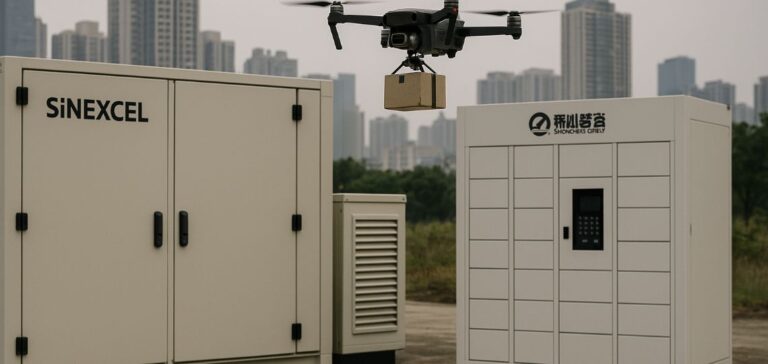Sinexcel, listed on the Shenzhen Stock Exchange, has unveiled a grid-connected Energy Storage System (ESS) designed for a low-altitude logistics station in Shenzhen. This pilot project, developed in partnership with Shenzhen Qihay, a company specialising in intelligent vehicles and the low-altitude economy, represents a global first. It forms part of a broader initiative to integrate new energy infrastructures into automated logistics services.
Modular storage integration into urban logistics
The site features a logistics service centre equipped with an intelligent parcel cabinet powered by a hybrid lithium-sodium battery system. Operated by artificial intelligence, the cabinet facilitates autonomous drone operations, including storage, sorting and distribution of parcels up to 5 kilograms within a 15-kilometre range. Similar pilot projects are scheduled to begin as early as June, according to initial projections by the manufacturer.
Technology developed under public R&D programme
This solution originates from a major research and development initiative in Guangdong Province focused on grid-connected storage converters. The system boasts enhanced energy density and an extended lifecycle, ensuring a stable power supply suited to urban environments and limited electricity networks. It provides a practical response to operational challenges faced by logistics platforms in remote or underserved areas.
Cost reduction and flexible deployment
In remote regions, logistics stations often contend with high electricity costs and unreliable power infrastructure. Sinexcel’s ESS is designed to address these issues through rapid redeployment capabilities and compatibility with photovoltaic installations. This modular setup enables the creation of mobile energy hubs combining solar generation, storage, and charging, suitable for agricultural or emergency scenarios.
Towards mobile energy standardisation
Sinexcel plans to accelerate the rollout of its grid-connected energy storage systems while broadening their applications. The company targets wider adoption of these technologies within automated logistics chains and emerging industry energy infrastructures. This strategic approach could pave the way for new standards in decentralised and mobile energy supply.





















